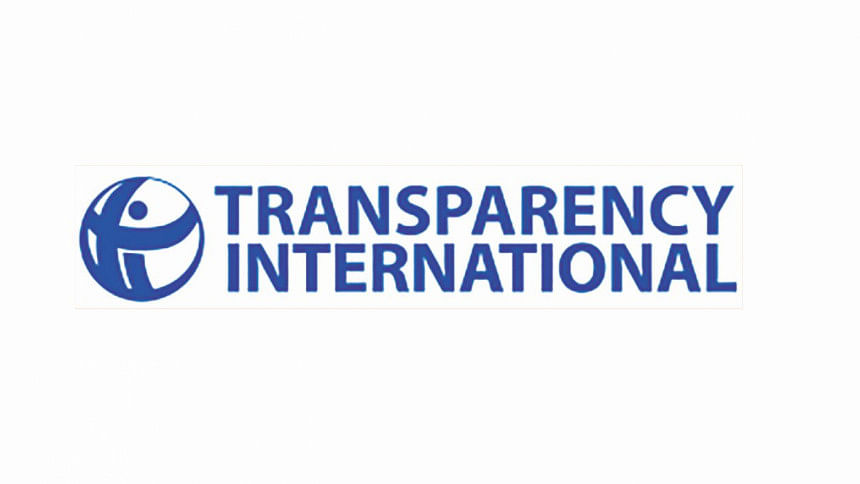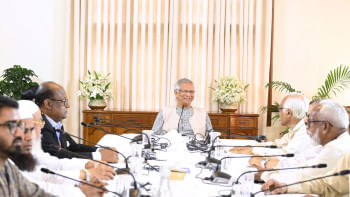Ti Corruption Perception Index: Ranking same, but ‘graft rose’

Bangladesh has been ranked 146th having scored only 26 out of 100 in the Transparency International Corruption Perceptions Index 2020. It failed to improve both in terms of ranking and score from the previous year.
The country has been placed at the 12th spot from the bottom, two notches worse from the previous index.
The index has been a flagship research of TI, a Berlin-based global graft watchdog, since 1995. This year, the index has been prepared on 180 countries. There have been instances where more than one country secured the same spot as they scored the same.
Disclosing the findings at a virtual press conference yesterday, Transparency International Bangladesh (TIB) said Bangladesh's overall performance in curbing corruption was "disappointing".
TIB Executive Director Iftekharuzzaman said the magnitude of graft in the country has increased. "Although Bangladesh's score remains unchanged, it is less than the global average of 43. Bangladesh's score is the second lowest among eight South Asian countries and the fourth lowest among 31 countries in the Asia Pacific region, which is embarrassing and frustrating," he said, according to a TIB press release.
Bangladesh is only ahead of war-torn Afghanistan among the South Asian nations in the index.
Iftekharuzzaman said Bangladesh's score has remained unchanged for the third time, but the score of Somalia, which is the lowest on the index, has increased by three points. "So, there is no room for complacency."
Detailing the reasons behind the disappointing performance of Bangladesh, the TIB said the country showed failure in transforming its high-profile anti-corruption pledge into a reality.
Erosion of political integrity and linkage of politics with abuse of power, corruption and criminality as well as dysfunctionality of key institutions of accountability and sustained impunity are among the key factors behind the poor performance, it said.
Policies and actions increasingly became detached from public interest reflecting pervasive conflict of interest, while political and government positions were increasingly taken as a "licence for personal enrichment".
Exposure of widespread corruption, especially in the health sector during the Covid-19 crisis, also contributed to the poor performance, TIB said.
It also said high-profile corruptions were rarely brought to justice, while there was a deficit in effectiveness of the Anti-Corruption Commission, especially in terms of accountability of the "big fish".
It said the financial and banking sector ravaged by incidents of loan default and fraud, shrinking media and civil society space, restrictions of freedom of speech, and deficit of tolerance of dissent were among the factors behind the poor performance.
Iftekharuzzaman pointed to the lack of effectiveness of the ACC in bringing big fish to trial or account and said it was a main reason behind the poor performance.
"There are questions and doubts regarding ACC's effectiveness while the commission has its deficiency in terms of bringing the big fish to account," he added.
The TIB boss said the government has to implement effectively its zero tolerance policy against corruption if the country wants to make an improvement.
Besides, there is a need for a paradigm shift in the country's culture of politics, he said.
Responding to a query, the TIB executive director said pledge to curb corruption from the government's top position was a "necessary condition", but it was not "sufficient" alone. "The sufficient condition is its [pledge's] enforcement."
Iftekharuzzaman said Bangladesh has been considered as a role model in terms of making progress in the development sector. To retain such development, progress has to be made in curbing corruption.
"Development will not be sustainable if there is failure in curbing corruption," he added.
BANGLADESH 7TH AMONG S. ASIAN COUNTRIES
Among the eight South Asian countries, Bangladesh remains the second last, both in terms of score and ranking, faring better than only Afghanistan, which scored 19 and was ranked 165th.
Maldives has recorded the highest rise in score by 14 points to 43 and jumped to the 75th position from 130th in 2019, shows the index.
Bhutan fared the best and sealed the 24th position with a score of 68. The Himalayan country is followed by India (ranked 86th; score 40), Sri Lanka (94; 38), Pakistan (124; 31), Nepal (117; 33), Bangladesh, and Afghanistan.
Also, Bangladesh's ranking is the 4th lowest among 31 Asia-Pacific countries included in the index, better than only Cambodia, Afghanistan and North Korea.
GLOBAL PICTURE
In the index, Denmark and New Zealand hold the first position, both scoring 88 out of 100.
With a score of 85, Finland, Singapore, Sweden and Switzerland have been ranked 3rd.
The other top ranking countries include Norway (7th), Netherlands (8th), Germany and Luxembourg (9th), and Australia and Canada (11th).
On the other hand, African countries Somalia and South Sudan scored 12 out of 100 and were ranked the lowest.
The other worst performers include Syria, Yemen, Venezuela, Sudan, Equatorial Guinea, Libya, North Korea, Haiti, and DR Congo.
In the index, 62 countries scored better than the previous year, the score of 70 countries, including Bangladesh, remained unchanged, and 48 countries scored less from the previous year.
For the index, TI used data from 13 international surveys.
For the Bangladesh part, data from eight different surveys were used.
Those are: World Economic Forum -- Executive Opinion Survey, Economist Intelligence Unit-Country Risk Assessment, World Justice Project- Rule of Law Index, Political Risk Service (PRS) International Country Risk Guide, Bertelsmann Foundation Transformation Index, Global Insight Country Risk Ratings, World Bank- Country Policy and Institutional Assessment, and Varieties of Democracy Project.
The data period considered for Bangladesh was between September 2018 and October last year.

 For all latest news, follow The Daily Star's Google News channel.
For all latest news, follow The Daily Star's Google News channel. 



Comments